Every online casino offers safer gambling tools, but what’s available, what works best, how can you use them, and what additional support is available? This is need-to-know information for any person who gambles.
Read on and find out how to stay safe gambling online in the USA.
Casino Cabbie is a US-licensed review site with over 20 years of experience in the industry. We are a trusted brand and an independent site. Our mission is to provide you with up-to-date reviews and information on all areas of gambling in the USA so you can make more informed and safer gambling choices.
We guarantee only to recommend legal gambling sites that adhere to strict consumer and gambling laws and provide responsible gambling tools, support, and education. Why? Because gambling is only fun when practiced responsibly.
Gambling is addictive - FACT. While most people can enjoy gambling occasionally, using it as a source of entertainment, for others, it's an addiction. Responsible gambling is something every player must practice. It's about reducing the risks and ensuring gambling is not damaging to you or those around you.
All gambling activities involve risk, so play smart. Arm yourself with information, know what steps you can take to reduce the risks, and how to get help should you need it (you'll find all this information and more on this page).
Established online gambling jurisdictions protect players from gambling harms; it's part of their duty of care to consumers. Yet, the US states that legalized online casino gambling (Delaware, New Jersey, Pennsylvania, Michigan, West Virginia, and Connecticut) and made casino games more accessible have alarmingly high problem gambling rates.
These figures show that more needs to be done to inform and protect players in the USA about the dangers of gambling addiction.
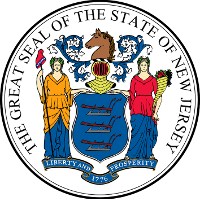
According to the New Jersey Division of Gaming Enforcement, in 2023, NJ had a problem gambling rate of 5.3% of the adult population (down from 6.3% in 2017), with 13% classed as low or moderate risk. This is more than three times the national average.
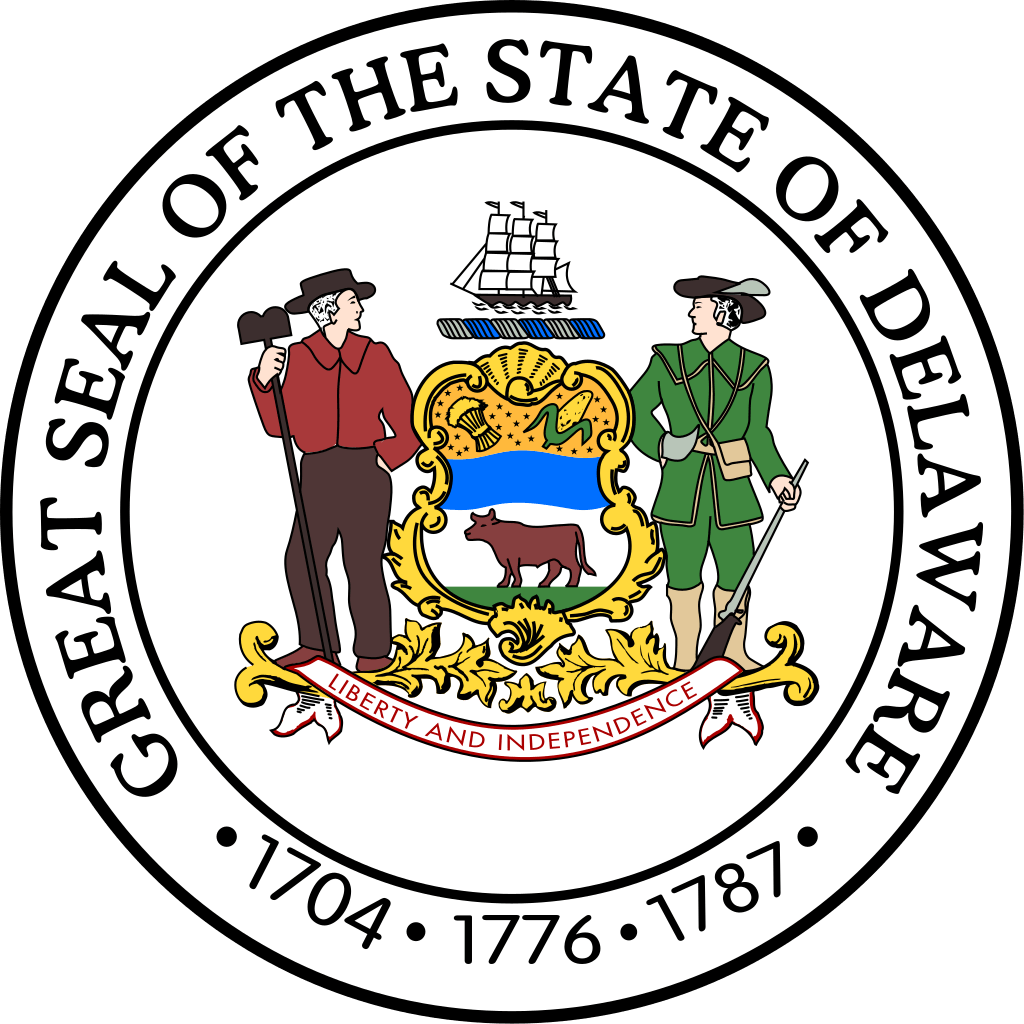
No up-to-date data or studies are available regarding rates of gambling addiction in Delaware. As such, we revert to the US national level of 1-2%. However, like other online gambling states, the actual figure is likely much higher than the national average.

According to research undertaken by Pennsylvania State University in collaboration with the Pennsylvania Gaming Control Board, "approximately one in three online gamblers expressed that they had experienced at least one problem* with their gambling in the past 12 months."
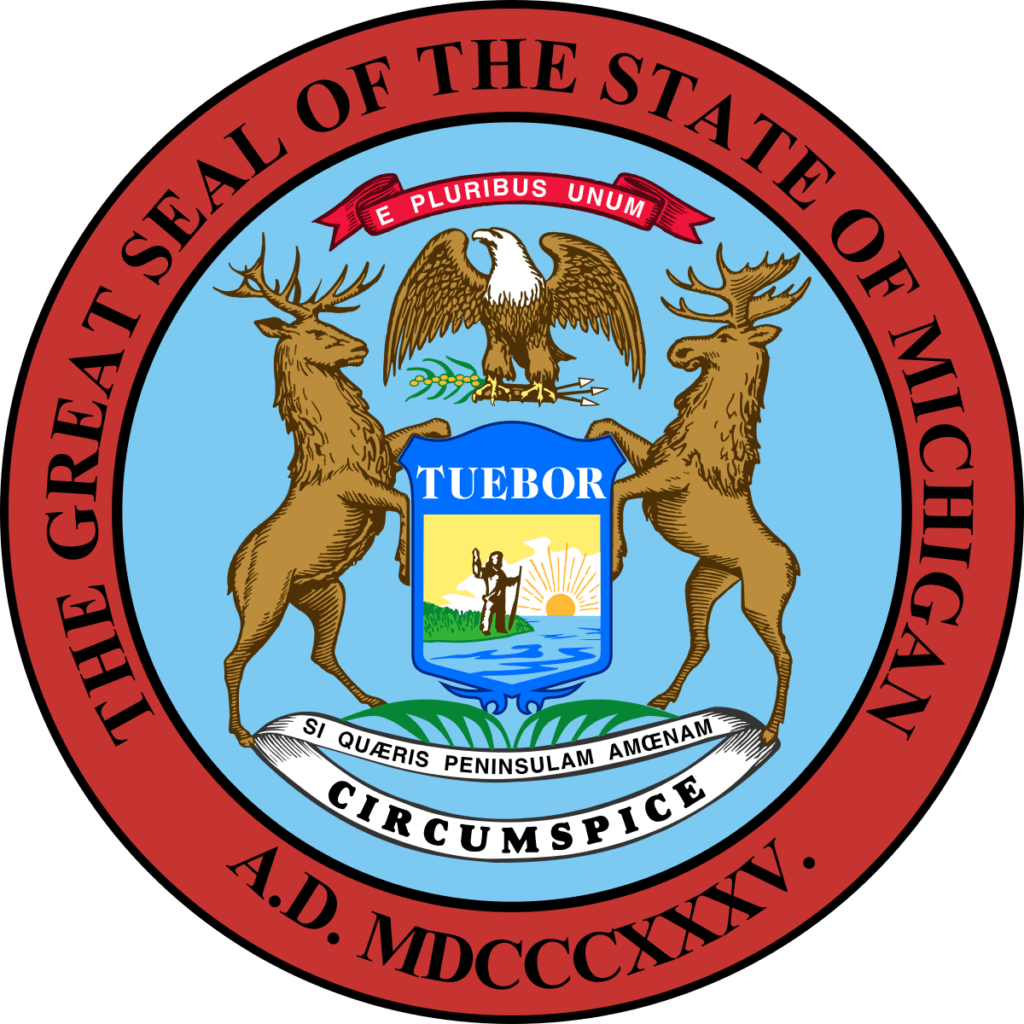
As a newer online casino state, we don't have problem figures. We know that during 2022, 4,306 calls were made to MI's Problem Gambling Hotline, an 18% increase from 2021 and a 171% increase on 2020 (pre-online gambling). Referrals for treatment have also increased. Stats tell us that only 1 in 10 problem gamblers seek help, meaning Michigan may have a very high rate of problem gamblers.

According to data from 1-800-Gambler West Virginia, 1 in every 50 residents will experience problems with gambling in WV, although experts say this is underrepresentation. Between 2021 and 2022, helpline calls increased by 6%, up to 1,759 calls.

Like many of the other online casino states listed here, CT tracks gambling revenue closely but not rates of problem gambling. What we do have is data on helpline calls. Since online gambling was legalized in the fall of 2021, calls to the CT Council on Problem Gambling Helpline have increased by 400%. Moreover, in the first nine months of online gambling in CT, 739 people registered for self-exclusion using the state's voluntary system.
*Note: according to the Pennsylvania research, problems do not refer to classification as a problem gambler; rather, there is a need for further assessment to determine whether an individual may be a problem gambler. Problems included gambling preoccupation; needing to gamble with large amounts to feel the same level of previous excitement; gambling for longer or more frequently; making attempts to cut down, control, or stop gambling; and borrowing money or selling belongings to gamble.
There's no cohesive system for measuring or reporting problem gambling in the USA because each state has an independent regulator, and different systems and metrics are in place. This also means different support services and levels of funding and research.
Despite the varying figures, one thing is clear: the rate of gambling addiction and harm is skyrocketing in the USA. Compared with other gambling jurisdictions, such as the UK, which has a problem gambling rate of 0.2% of the adult population, the figures are even more worrying.
If you're a regular gambler, we recommend doing this test at least once a year. It's a quick and straightforward gambling health check. If you answer yes to four or more of these questions, it's likely you have a gambling disorder (the more you display, the higher your degree of risk) and should seek help.
Before taking the test, bear in mind that you may have periods when symptoms subside; this doesn't mean you're in the clear, as this has been recorded in those experiencing problem gambling.

If you answered yes to four or more of the questions on this list, skip to the state-by-state support services section. There, we detail the local support services available, including state government options and charity support services like the National Council on Problem Gambling. These services are impartial and designed to help.
Responsible gambling awareness and education is the first and most important tool for protecting yourself while gambling online. Once you understand problem gambling and the signs of gambling harm, you can better assess your behavior and know if your gambling becomes harmful.
If you think this information is something only those who struggle with gambling need to know, you're wrong. Every person who lays real bets online must be informed of the potential harms and the best practices for staying safe - it's how you play smart.
Every US online casino and sportsbook must provide responsible gambling tools to players. In this section, we will explain how each works and give you step-by-step instructions on how to set it up on your casino or sportsbook account.
A deposit limit allows you to set a budget for the maximum amount you can add to your casino account daily, weekly, or monthly. Similarly, a spending or bet limit regulates the amount you can spend/wager.
Deposit limits ensure you keep to your intended budget and do not get carried away while gambling, which can lead to overspending. Every player should have a budget before gambling; it's a vital part of casino gaming and can also be implemented strategically through bankroll management to guide how you bet.
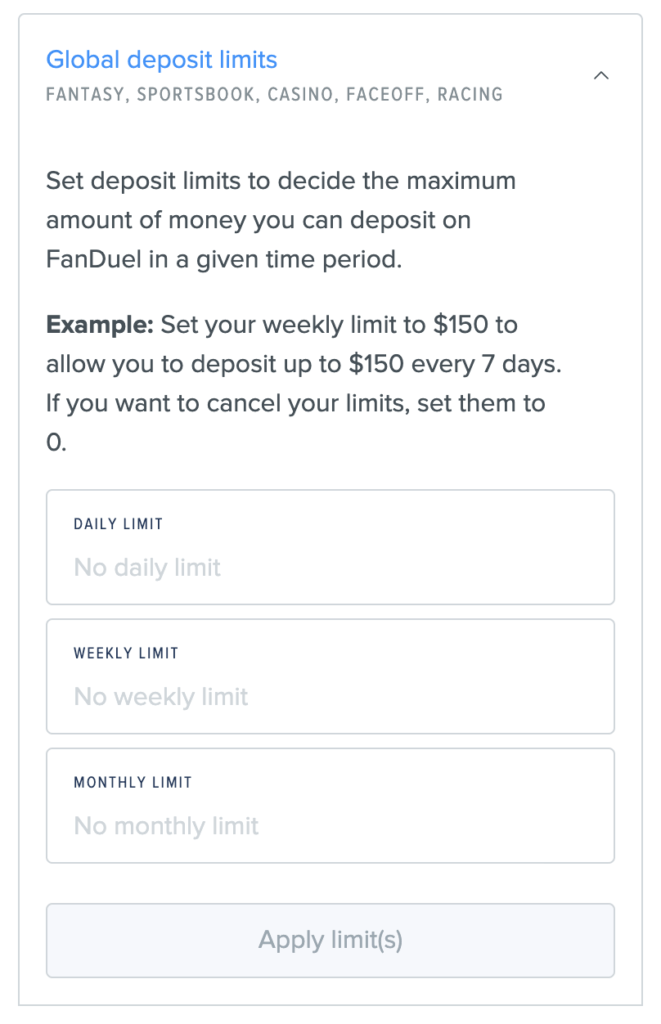
If the casino team is concerned about your limit change, they may also reach out to check on your welfare.
Playtime limits are about regulating the amount of time you spend gambling daily. They are important because even low rollers, who don't spend large amounts at the casino, can gamble compulsively. If you set a daily playtime limit of two hours after the time is up, you won't be able to log in to your casino account or play until the next day, when the limit resets.
Playtime reminders are slightly different from playtime limits. They are pop-up messages reminding you about the amount of time you've spent gambling. They have been found to help prevent dissociation, common in slot players, as the games are immersive, leading to players losing track of time and play.
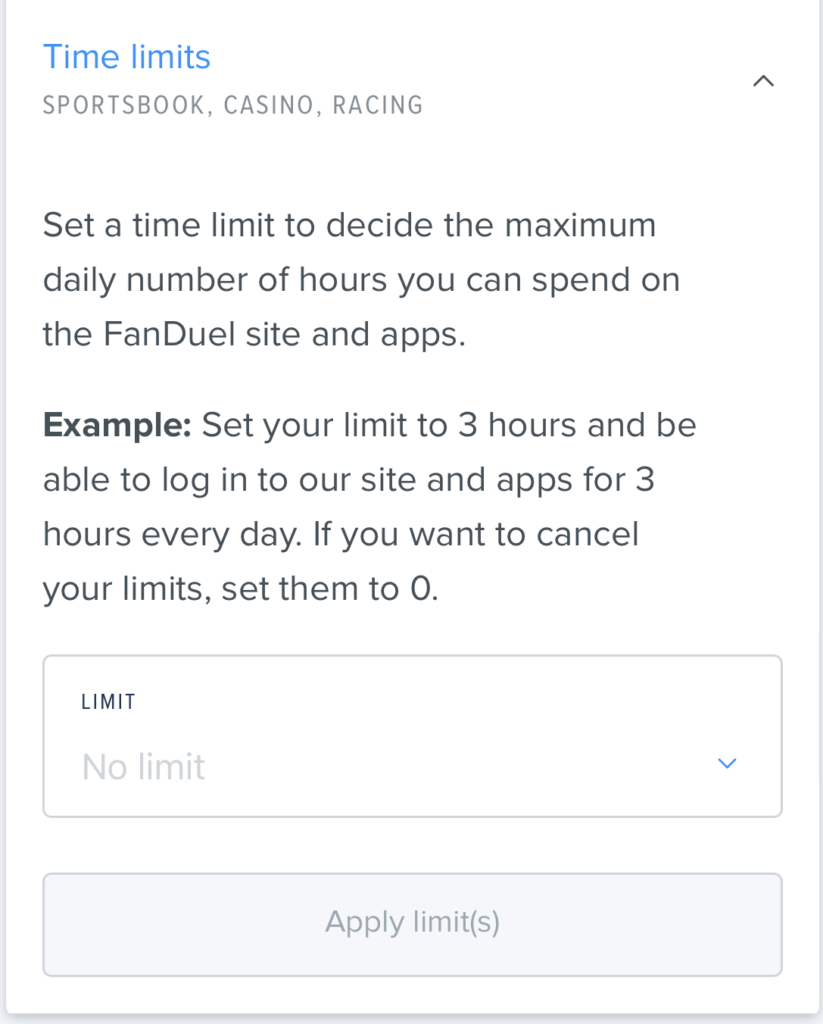
If you want to decrease a playtime limit, changes are instant. The casino will enforce a 24-72 hour waiting period to increase or remove your playtime limit.
A timeout means taking a break from a gambling site. Once set, this responsible gambling tool means you'll be locked out of the casino for the requested period. Timeouts are usually available from three days up to six weeks.
These are good options if you recognize that you need a break or want to restrict your gambling to certain days. For example, if you only want to gamble during the week, you can set a 5-day timeout limit on your account.
You must contact the casino via email or phone to extend or reduce a timeout before it ends. You cannot access your account during the timeout period. If, during a timeout, you decide you do not want to gamble anymore and want to withdraw your account funds, you should also contact the casino to arrange a cashout and close your account.
There are two types of self-exclusion. Exclusion for a casino site or self-exclusion from all gambling services legally available in the state. The main difference is that if you are excluded from a casino, you can still join a different site and continue gambling. However, if you use the state-wide self-exclusion scheme, you won't be able to register with any online casino licensed in that location.
Self-exclusion is the most robust tool in the responsible gambling tool kit and is usually used by players experiencing problem gambling or compulsive gambling. It can be set for between one to five years or permanently.
During a self-exclusion period, you will not be contacted by the casino and will automatically be opted out of all marketing communications. Any future bets or upcoming contests you have entered will be refunded.
After a casino or state-wide self-exclusion period, if you wish to rejoin a gambling site, you'll need to contact the casino support team/state regulatory body, depending on which type of self-exclusion you opt for. If you request a permanent exclusion, this cannot be undone.
Research has found that self-exclusion works best in preventing future gambling when combined with other support services, like talking therapies or support groups. Hence, if you decide to self-exclude, make sure you also get in touch with another service, like Gamblers Anonymous.
If you have funds in your account when you self-exclude, the casino will automatically process your cashout and return the money via the deposit method.
Each online casino state has a state-wide self-exclusion scheme, which you can register for directly via the regulator. The process may vary in each state, but you can find the complete instructions and process via the following links:
| Operator | Available in | Deposit Limits | Playtime Limits | Timeout | Self-Exclusion |
|---|---|---|---|---|---|
| 888 Casino | NJ | ||||
| Bally Casino | NJ, PA | ||||
| Bally's Dover Casino | DE | ||||
| Barstool Casino | NJ, PA | ||||
| bet365 Casino | NJ | ||||
| BetMGM Casino | NJ, PA, MI, WV | ||||
| betParx Casino | NJ, PA | ||||
| BetRivers Casino | NJ, PA, MI WV | ||||
| Betway Casino | NJ, PA | ||||
| Borgata Casino | NJ, PA | ||||
| Caesars Casino | NJ, PA, MI, WV | ||||
| Delaware Park Online Casino | DE | ||||
| DraftKings Casino | NJ, PA, MI, WV, CT | ||||
| Eagle Casino and Sports | MI | ||||
| FanDuel Casino | NJ, PA, MI, WV, CT | ||||
| FireKeepers Casino | MI | ||||
| Golden Nugget Casino | NJ, PA, MI, WV | ||||
| Hard Rock Casino | NJ | ||||
| Bally's Dover Casino | NJ | ||||
| Harrington Gaming Online | DE | ||||
| Hollywood Casino | PA | ||||
| Mohegan Sun Casino | NJ, CT | ||||
| Ocean Online Casino | NJ | ||||
| Pala Casino | NJ | ||||
| Party Casino | NJ | ||||
| Play Gun Lake Casino | MI | ||||
| PlayLive! Casino | PA | ||||
| PlayStar Casino | NJ | ||||
| PointsBet Casino | NJ, MI | ||||
| PokerStars Casino | NJ, PA, MI | ||||
| Resorts Casino | NJ | ||||
| Scores Casino | NJ | ||||
| SI Casino | MI | ||||
| Stardust Casino | NJ, PA | ||||
| SugarHouse Casino | PA | ||||
| Tipico Casino | NJ | ||||
| Tropicana Casino | NJ, PA | ||||
| TwinSpires Casino | NJ, PA, MI | ||||
| Unibet Casino | NJ, PA | ||||
| Virgin Casino | NJ | ||||
| Wheel of Fortune Casino | NJ | ||||
| Wind Creek Casino | PA | ||||
| WynnBet Casino | MI |
Aside from educating players on how to gamble responsibly and the tools available to them, like deposit limits, there are many other ways casinos can promote responsible gambling. Here are a few:
| State | Official Responsible Gambling Organization | Hotline Phone Number | Helpline Availability | Live Chat |
|---|---|---|---|---|
| New Jersey | Council on Compulsive Gambling of New Jersey | 1-800- GAMBLER | 24/7 | Yes |
| Delaware | Delaware Council Gambling Problem Helpline | 1-888-850-8888 | 24/7 | Yes |
| Pennsylvania | Council on Compulsive Gambling of Pennsylvania | 1- 800-848-1880 | 24/7 | Yes |
| Michigan | Michigan Problem Gambling Helpline | 1-800-270-7117 | 24/7 | No |
| West Virginia | West Virginia's Problem Gambling Help Network | 1-800- 426-2537 | 24/7 | Yes |
| Connecticut | Connecticut Council on Problem Gambling | 1-888-789-7777 | 24/7 | Yes |
Outside of state services, multiple charity organizations aim to support those struggling with problem gambling as well as their family and friends. These free services are crucial and include support groups, therapy, in-person meetings, online chat services, and more.
If you're considering self-exclusion from gambling, we highly recommend also using one of the following support services, as using multiple support methods leads to lower rates of repeat gambling in those who self-exclude for shorter periods.
The National Council on Problem Gambling (NCPG) is available in almost every state. It's a countrywide organization and one of the most prominent working with problem gambling support and advocacy. They provide information on available treatments, screening tools, and a 24/7 helpline and chat service.
The NCPG is instrumental in advocating for greater regulation and legislation to protect players and raise public awareness. They assist an average of 18,592 players monthly, operating on an ethos of respect and neutrality.
Gamblers Anonymous is a support service for those suffering from compulsive gambling. They follow a twelve-step program with locally run support groups in most states. You can join their virtual meetings if you're in a location without a physical meet-up.
The only requirement to join a meeting is the want to stop gambling. Online resources are also open to family members, friends, or anyone affected by another person's gambling.
GamTalk is an online support and information service. Their main goal is to prevent problem gambling by spreading awareness and education. They don't operate a phone line, but a multi-language community chat forum and chat rooms are available.
Aside from the self-exclusion tools and support services we've listed, if you want an extra layer of protection that prevents you from gambling online, these are the top three gambling site-blocking apps and services. When installed on a device or browser, they prevent you from accessing all gambling sites.

BetBlocker is our number one recommendation for a gambling site-blocking app because it is free and easily accessible to everyone. You don't need to share your personal information with the service and can access the software anonymously.
BetBlocker currently restricts 77,300+ gambling websites (you can also suggest sites that should be blocked), is available globally, and only takes two minutes to download and set up. One feature we particularly like is that if you're a casual gambler wanting to restrict which days you gamble on, you can use BetBlocker's calendaring tool. BetBlocker is available for Mac OS, Windows, Linux, iOS, Android, FireOS and AppGallery.
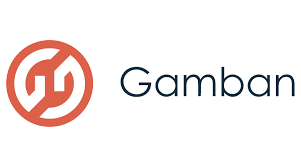
GamBan is a paid service and one of the cheaper ones out there. Like BetBlocker, when in use, it blocks gambling sites and apps. UK gambling charity GambleAware has independently evaluated it as 99% successful in blocking legal and illegal gambling sites and the most effective of six different options.
GamBan works on Mac OS, Windows, Android, and iOS. The $34.99 per year covers unlimited devices and can be paid at $3.49 per month rather than the annual fee. GamBan also blocks crypto and trading platforms.

GamBlock is the priciest service out of the three, as costs depend on the number of devices you want to use it on, but it's also one of the most comprehensive. It's available for Android, Windows, or Apple. The settings survive factory resets on devices and are still effective with VPN and TOR use, so there's no way of getting around it.
GamBlock prices start at around $150 per device, depending on the operating system.
Responsible gambling is a concept that’s about recognizing that gambling is addictive and taking sensible steps to lower the risks, like setting a budget, using playtime reminders, and being aware of the signs of gambling harm and monitoring them.
Anyone who gambles is at risk, but research has shown that people who already have addiction issues (like drugs and alcohol) and younger gamblers are more at risk.
Education, awareness, and following responsible gambling guidelines are the best defense against gambling addiction.
If you’ve not already, arm yourself with knowledge, tips, and responsible gambling strategies by reading the complete guide on the page above.
Scroll up to the "state-by-state support services" section on the page above. You'll find your state's problem gambling helpline number in the table.
If you live in a location with no localized services, then the National Council on Problem Gambling Helpline number is given.
Problem gambling hotlines are impartial and there to help. There are no ramifications to seeking help. If you're worried, you can always stay anonymous when you call.
Each online casino and sportsbook has a responsible gambling section. You can usually access it via the main menu or the site footer. There, you'll find the casino's responsible gambling policy.
Due to the nature of this page, we don't want to advertise casinos here. However, we know some readers may have hit this page looking for a list of the top-rated and responsible online casinos. If this is you, follow the link and check out our reviews to find a legal and safe gambling site.